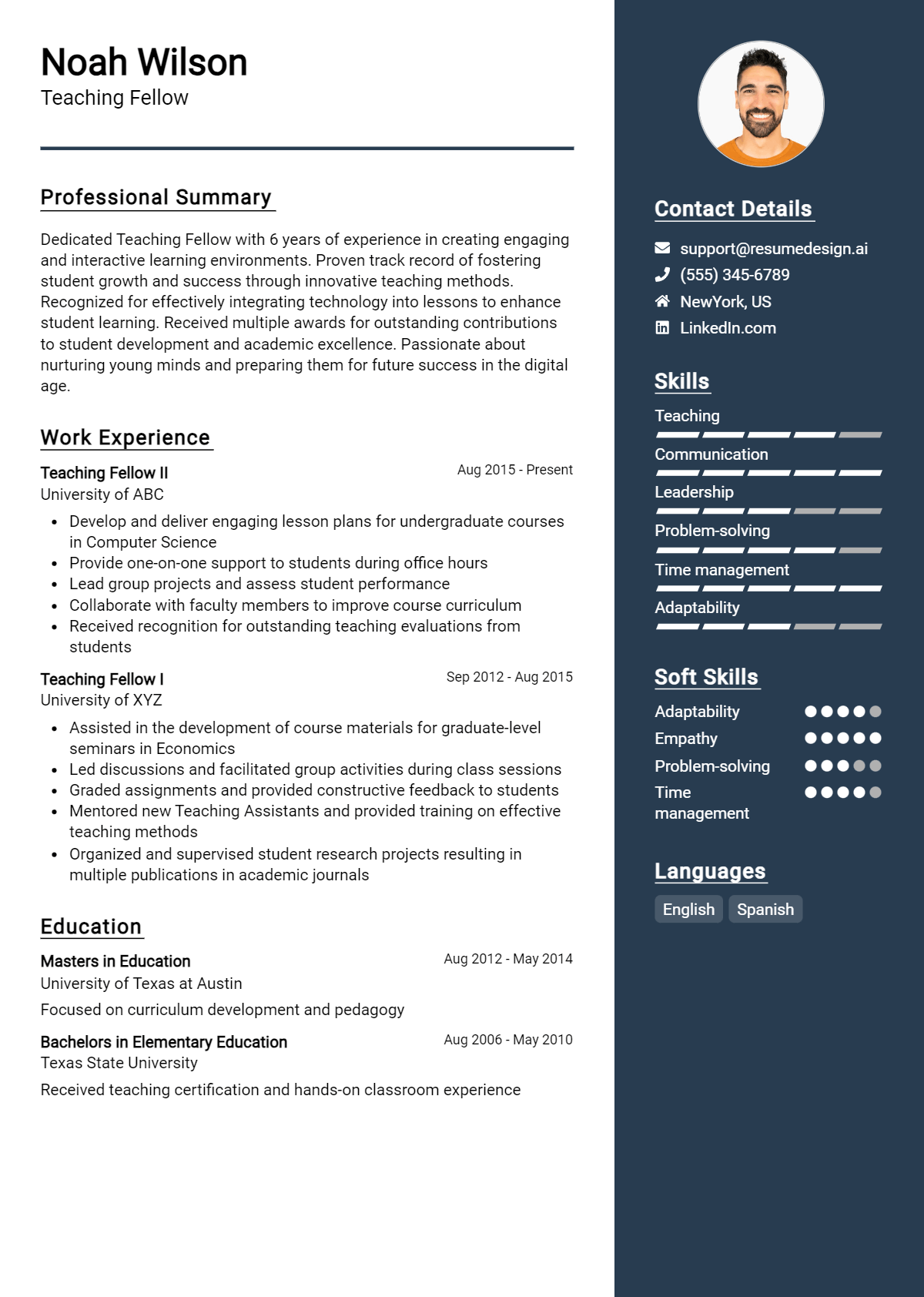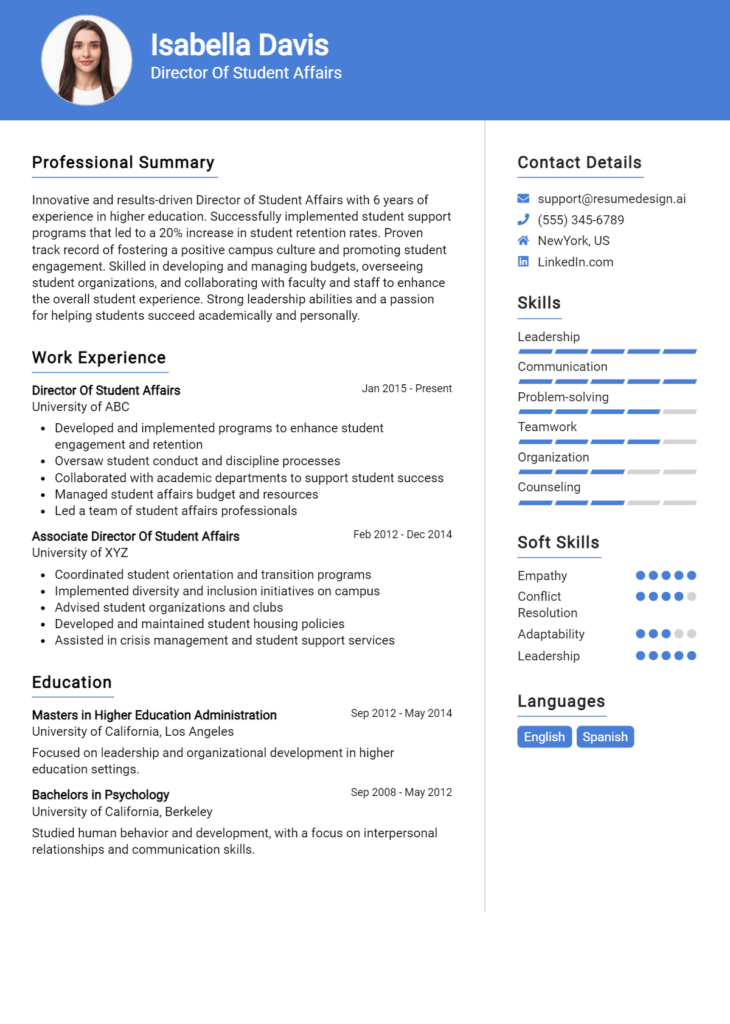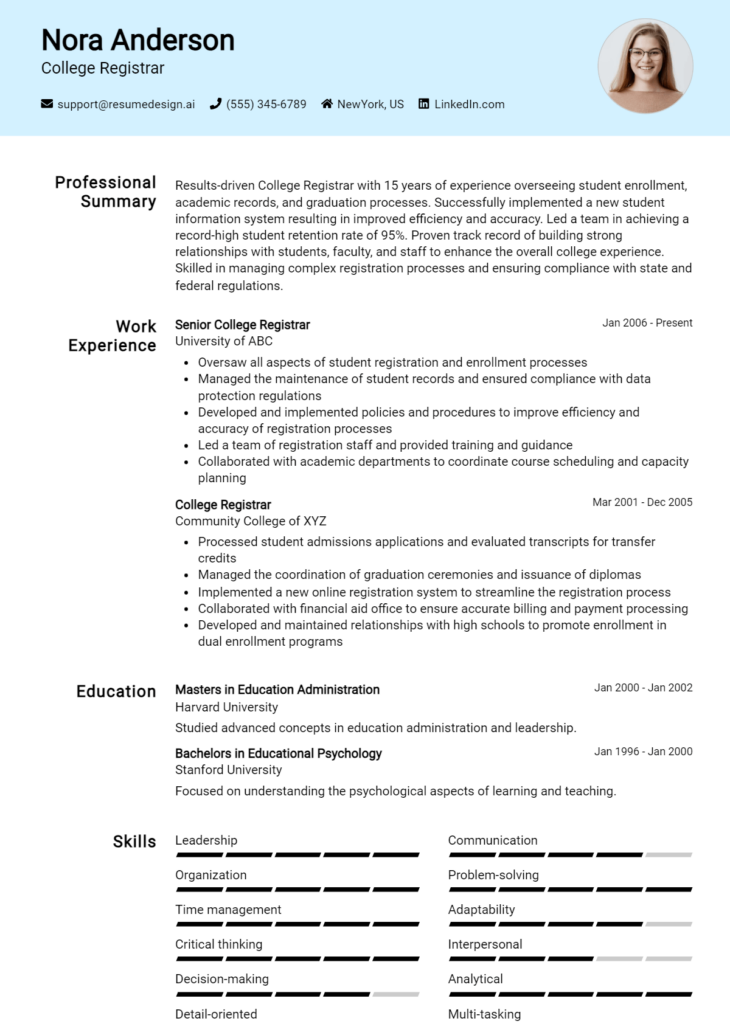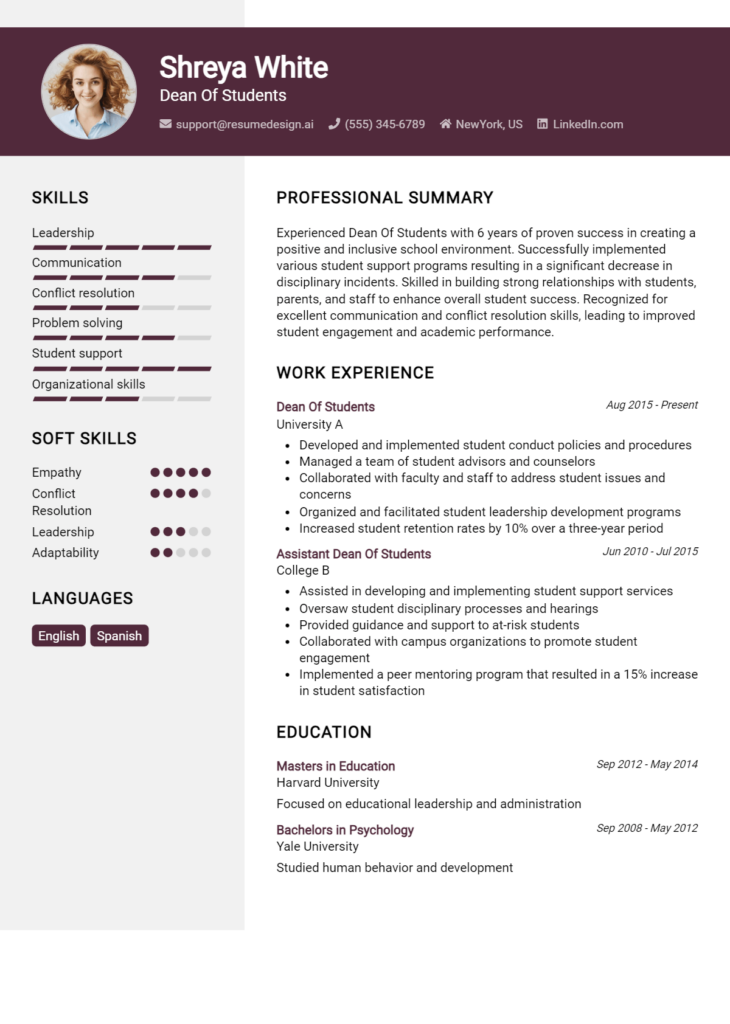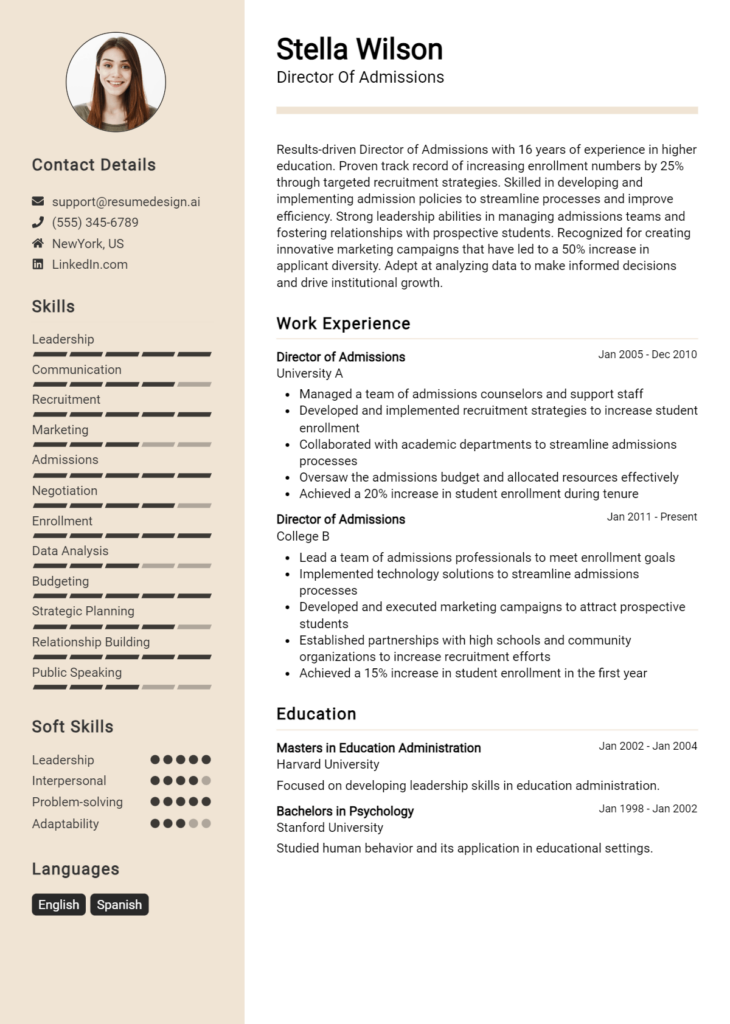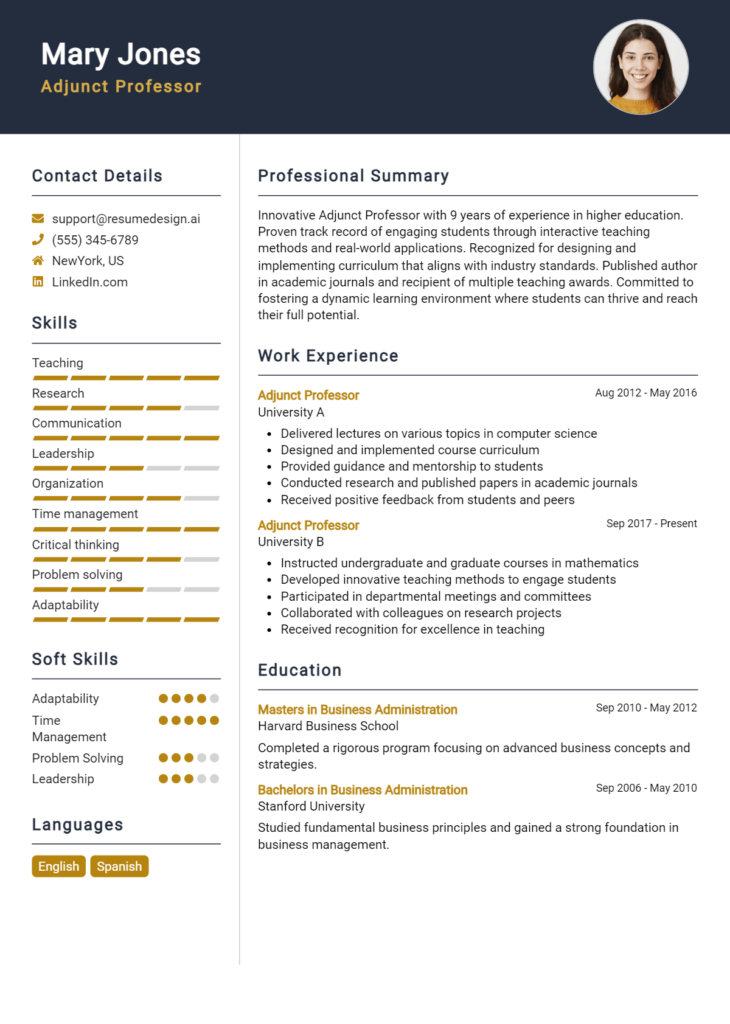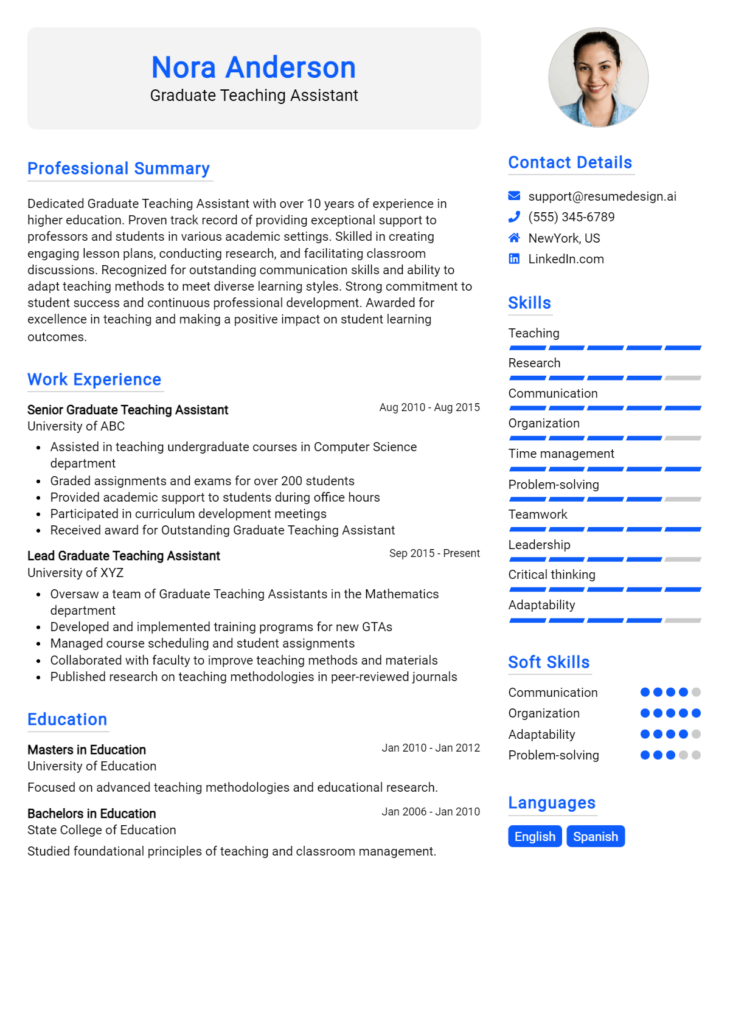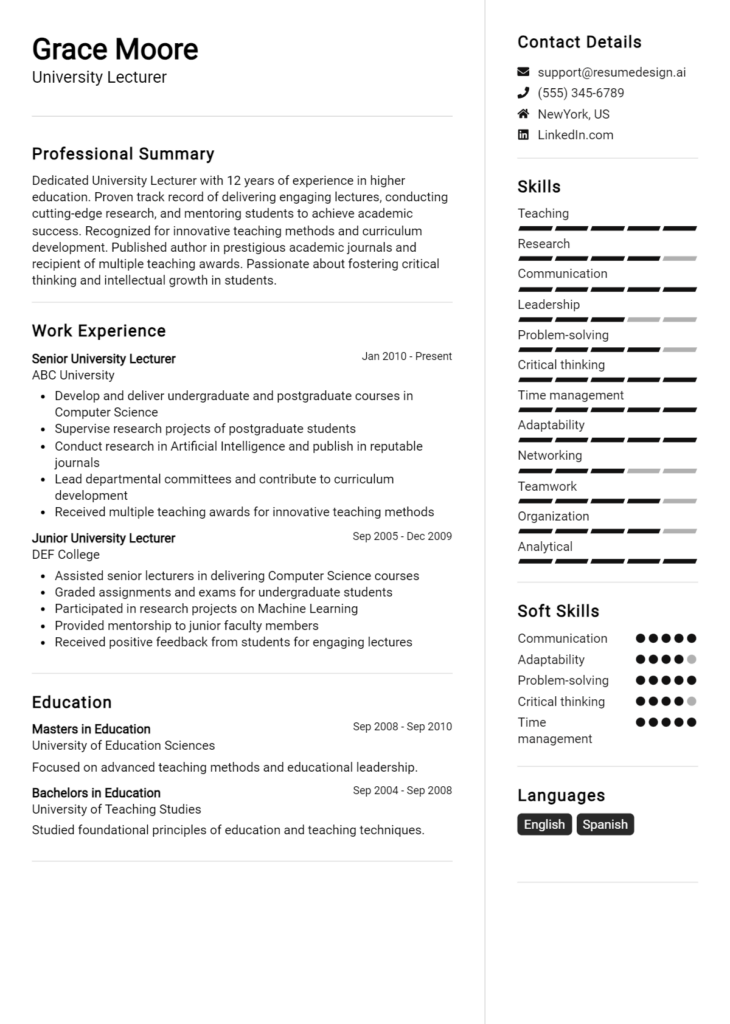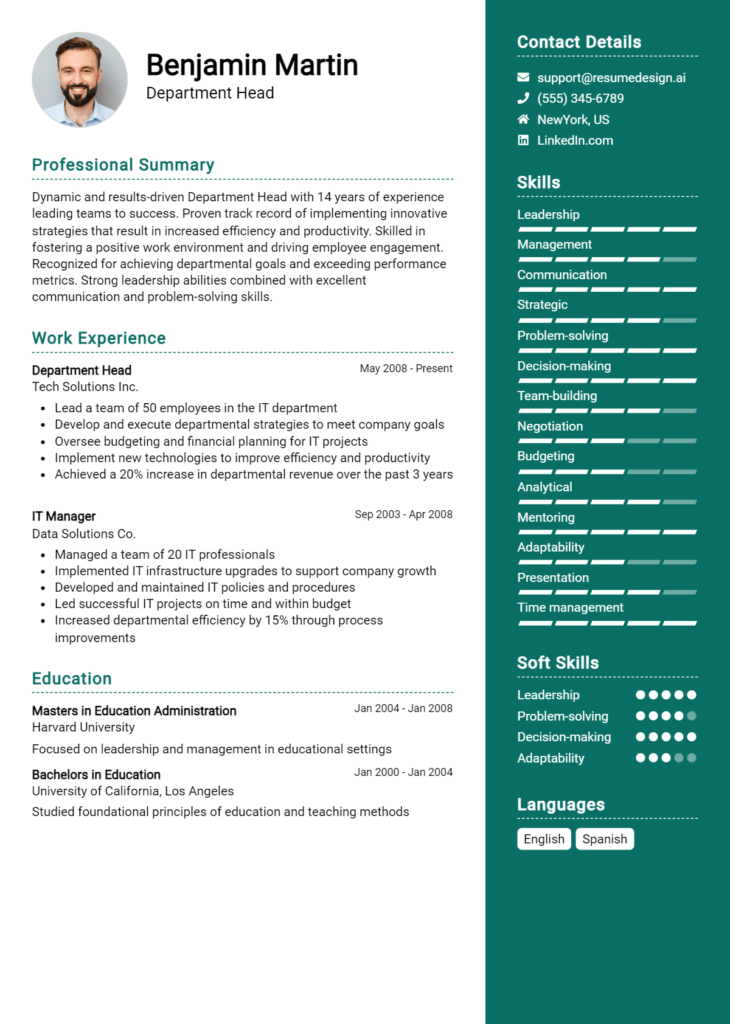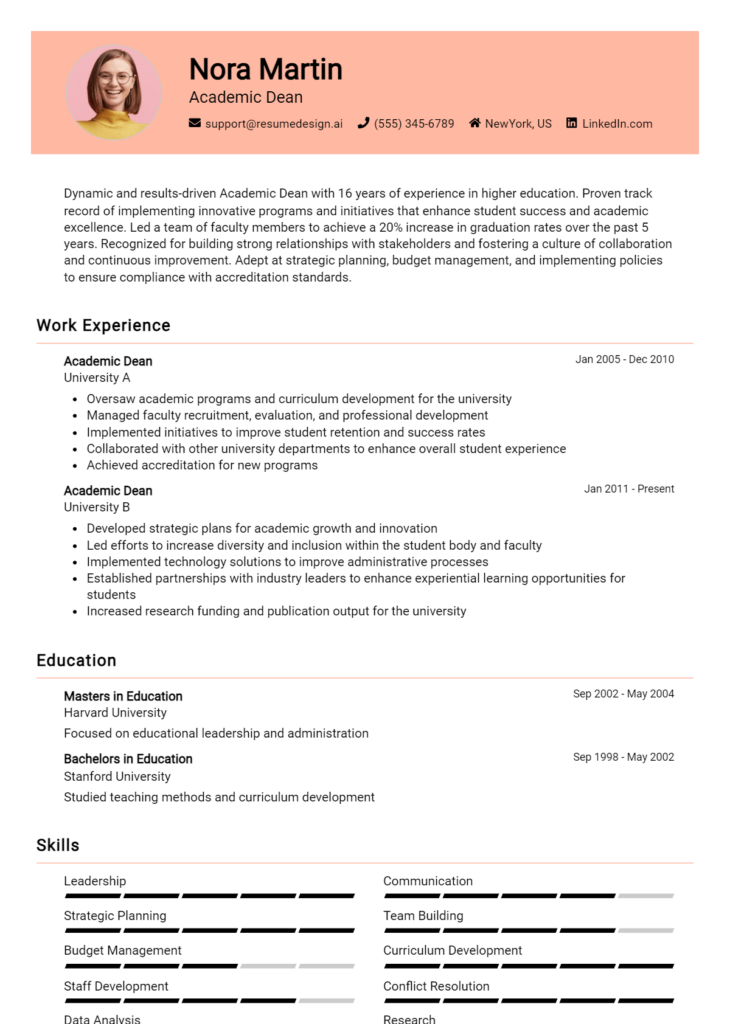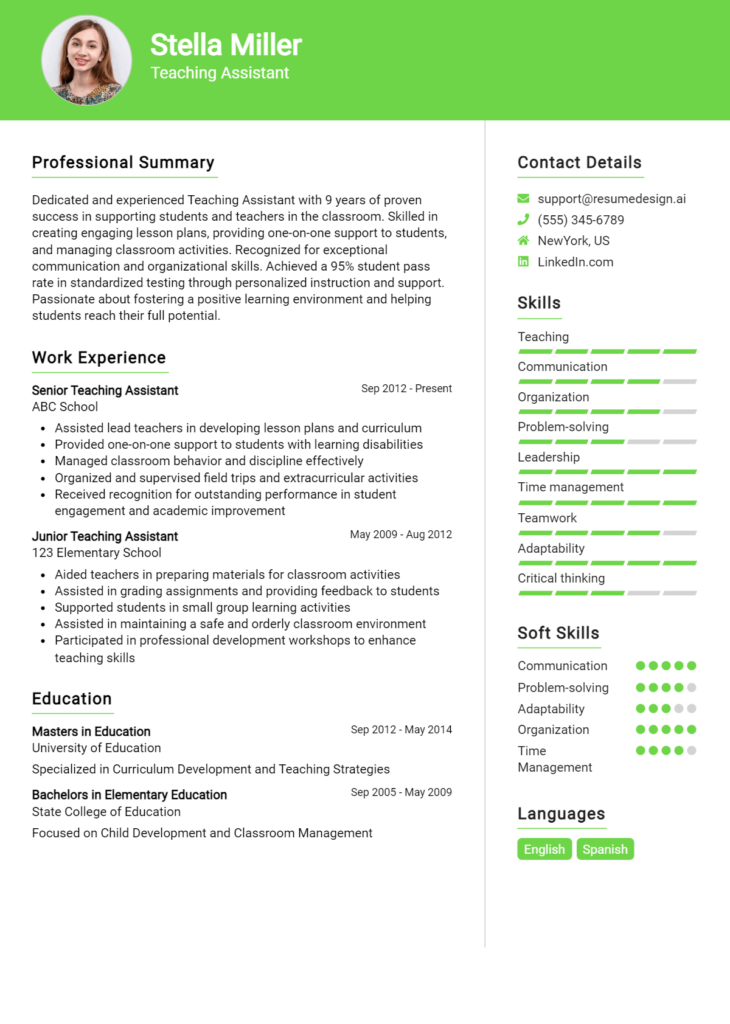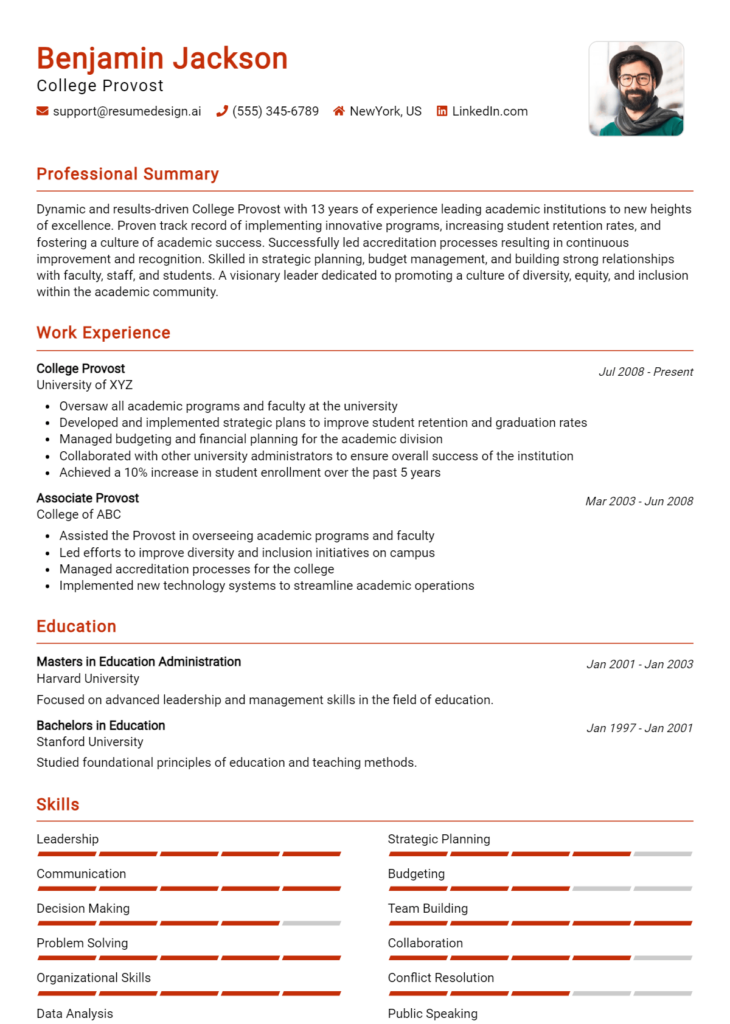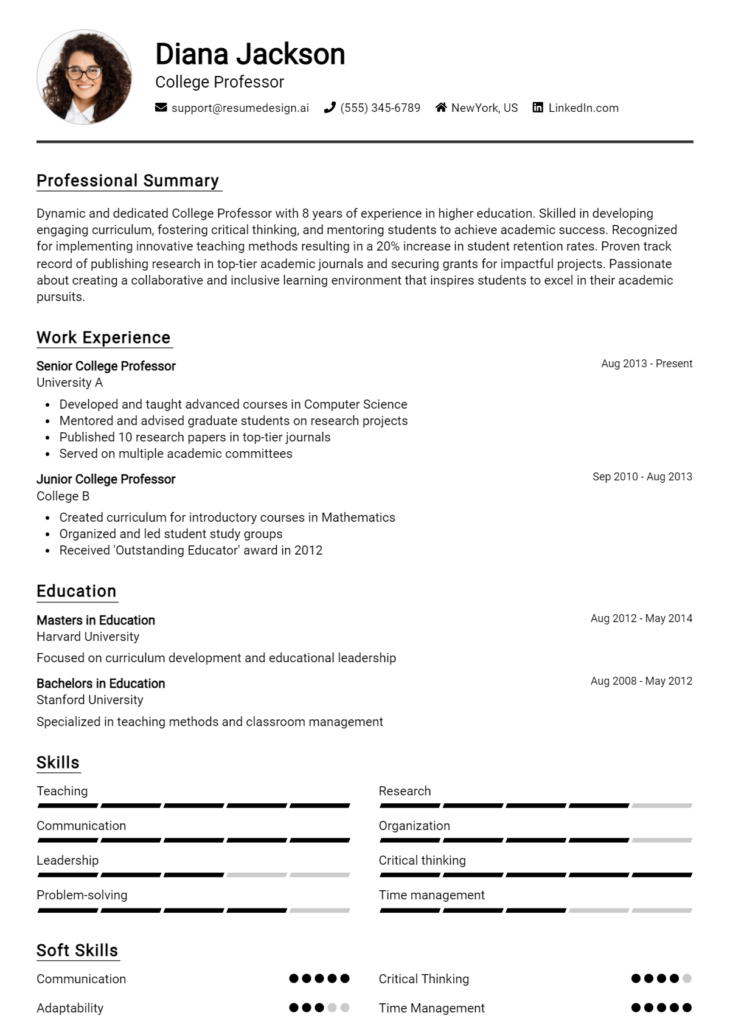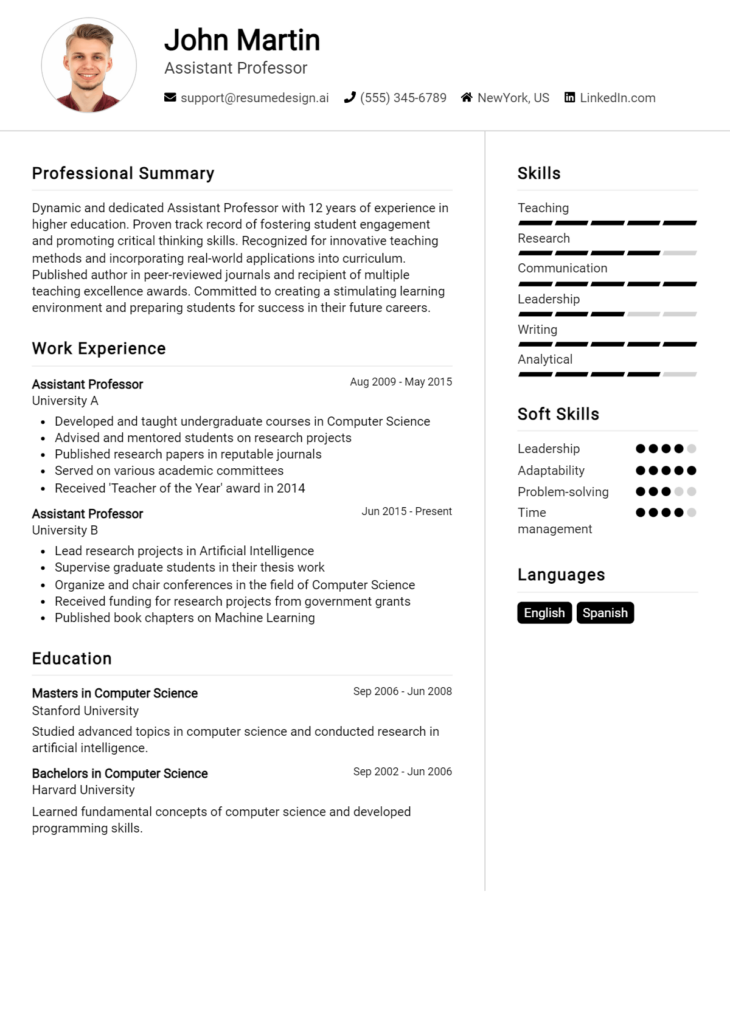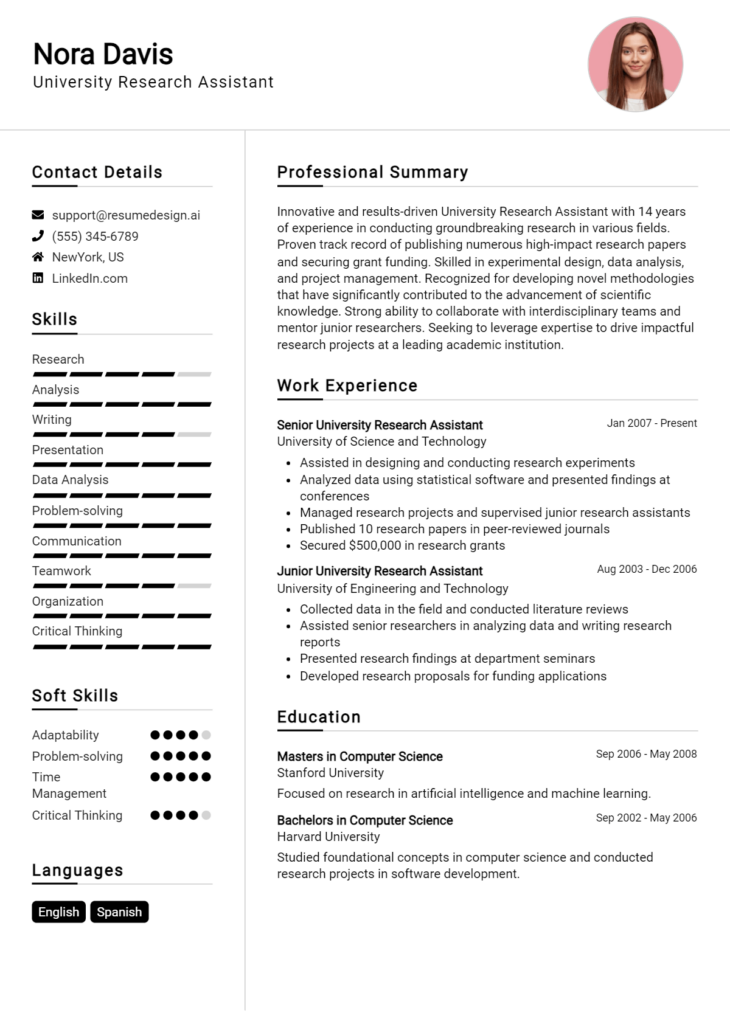Teaching Fellow Core Responsibilities
A Teaching Fellow plays a crucial role in academic settings, bridging various departments and functions to enhance educational quality. Key responsibilities include assisting in course design, delivering lectures, mentoring students, and conducting research. Essential skills encompass technical proficiency in relevant subjects, operational efficiency in managing classroom dynamics, and strong problem-solving abilities to address student needs. These competencies contribute significantly to the organization’s educational goals, and a well-structured resume can effectively highlight these qualifications, showcasing the candidate’s readiness for the role.
Common Responsibilities Listed on Teaching Fellow Resume
- Assisting in the development and delivery of course content
- Leading discussion sections and tutorial sessions
- Providing academic support and mentorship to students
- Conducting research and contributing to scholarly publications
- Grading assignments and providing constructive feedback
- Collaborating with faculty to improve curriculum
- Organizing workshops and academic events
- Utilizing educational technology to enhance learning
- Conducting assessments to evaluate student performance
- Participating in departmental meetings and committees
- Supporting diversity and inclusion initiatives
- Staying updated on developments within the discipline
High-Level Resume Tips for Teaching Fellow Professionals
In today's competitive academic environment, a well-crafted resume is essential for Teaching Fellow professionals looking to make a lasting impression on potential employers. Often the first point of contact between a candidate and a hiring committee, your resume needs to effectively showcase not only your skills and experience but also your unique achievements in the field of education. A strong resume can open doors to interviews and opportunities, making it crucial to present yourself in the best possible light. This guide will provide practical and actionable resume tips specifically tailored for Teaching Fellow professionals, helping you to create a compelling narrative that highlights your qualifications and readiness for the role.
Top Resume Tips for Teaching Fellow Professionals
- Tailor your resume to the specific job description by using keywords and phrases that match the requirements outlined in the posting.
- Highlight relevant teaching experience, including courses taught, subjects covered, and the age groups or demographics of students engaged.
- Quantify your achievements by including metrics such as student success rates, retention rates, or improvements in test scores to demonstrate your impact.
- Include industry-specific skills, such as curriculum development, classroom management, and assessment techniques that are pertinent to the Teaching Fellow role.
- Showcase any relevant certifications or professional development courses that enhance your qualifications for the position.
- Use clear and concise language, avoiding jargon, to ensure your resume is easily understood by all reviewers.
- Incorporate a professional summary at the top of your resume that succinctly outlines your experience, skills, and career goals.
- Ensure your resume is well-organized with clearly defined sections, making it easy for hiring committees to locate key information.
- Proofread your resume multiple times to eliminate any errors in spelling, grammar, or formatting that could detract from your professionalism.
- Consider including a section for relevant publications, presentations, or conference participation to further establish your expertise in the field.
By implementing these tips, you can significantly increase your chances of landing a job in the Teaching Fellow field. A polished and tailored resume will not only highlight your qualifications but also demonstrate your commitment to the education profession, making you a standout candidate in the competitive academic job market.
Why Resume Headlines & Titles are Important for Teaching Fellow
In the competitive landscape of academia, a Teaching Fellow's resume stands out through the strategic use of headlines and titles. These elements serve as the first impression for hiring managers, encapsulating a candidate's key qualifications in a succinct and impactful phrase. A strong headline can immediately capture attention, providing a snapshot of the applicant's expertise and relevance to the position being applied for. Therefore, crafting a headline that is concise, relevant, and directly aligned with the job description is critical for making a lasting impression.
Best Practices for Crafting Resume Headlines for Teaching Fellow
- Keep it concise: Aim for one impactful phrase that summarizes your qualifications.
- Be role-specific: Tailor your headline to reflect the specific Teaching Fellow position you are applying for.
- Highlight key skills: Incorporate essential skills or areas of expertise that align with the job description.
- Use strong action words: Choose dynamic verbs to convey your capabilities and contributions.
- Focus on accomplishments: Mention noteworthy achievements that showcase your effectiveness as an educator.
- Maintain professionalism: Ensure the tone is formal and suitable for an academic environment.
- Avoid jargon: Use clear language to ensure understanding and accessibility for all readers.
- Revise regularly: Update your headline as you gain new skills or experiences relevant to the role.
Example Resume Headlines for Teaching Fellow
Strong Resume Headlines
Dynamic Teaching Fellow with Expertise in Curriculum Development and Student Engagement
Innovative Educator Specializing in STEM Instruction and Collaborative Learning
Passionate Teaching Fellow Committed to Fostering Inclusive Learning Environments
Results-Driven Teaching Fellow with a Track Record of Enhancing Student Performance
Weak Resume Headlines
Teaching Fellow Looking for Job
Education Professional
Experienced Teacher
The strong headlines are effective because they are specific, convey the candidate's strengths, and align closely with the role of a Teaching Fellow, making them memorable to hiring managers. In contrast, the weak headlines fail to impress due to their vagueness and lack of detail, leaving the reader with no clear understanding of the candidate's qualifications or suitability for the position. A compelling headline is essential to differentiate oneself in a crowded applicant pool.
Writing an Exceptional Teaching Fellow Resume Summary
A resume summary is a crucial component for a Teaching Fellow position, as it serves as the first impression that captures the attention of hiring managers. A strong summary succinctly highlights key skills, relevant experience, and notable accomplishments that align with the specific requirements of the role. In a competitive job market, an impactful summary can differentiate a candidate from others by providing a snapshot of their qualifications and potential contributions to the educational institution. It should be concise, engaging, and specifically tailored to the job to effectively convey the candidate's suitability for the Teaching Fellow position.
Best Practices for Writing a Teaching Fellow Resume Summary
- Quantify achievements to demonstrate impact, such as improvements in student performance or program success rates.
- Focus on relevant skills that align with the job description, showcasing both teaching abilities and subject matter expertise.
- Tailor the summary to the specific job by incorporating keywords and phrases found in the job posting.
- Keep it concise, ideally 2-4 sentences, ensuring that every word adds value.
- Highlight unique qualifications, such as specialized training, certifications, or innovative teaching methods.
- Use active language and strong verbs to convey a sense of energy and initiative.
- Showcase any leadership or mentoring experiences that demonstrate your ability to guide and support students.
- Maintain a professional tone that reflects your passion for education and commitment to student success.
Example Teaching Fellow Resume Summaries
Strong Resume Summaries
Dynamic Teaching Fellow with over 5 years of experience in developing and implementing innovative curriculum strategies that increased student engagement by 30%. Proven ability to cultivate a collaborative learning environment and mentor undergraduate students to achieve academic excellence.
Results-oriented educator with a Master's degree in Education and a track record of enhancing student performance by 20% through tailored instructional techniques. Adept at integrating technology into the classroom to foster interactive and inclusive learning experiences.
Enthusiastic Teaching Fellow with expertise in STEM education, recognized for leading a tutoring program that improved student test scores by an average of 15%. Skilled in creating engaging lesson plans that accommodate diverse learning needs.
Weak Resume Summaries
Experienced teacher looking for a new opportunity. I have worked with students and helped them learn.
Teaching Fellow with some skills in education. I am passionate about teaching and enjoy working with students.
The strong resume summaries are considered effective because they provide specific details about achievements, quantify results, and clearly relate to the responsibilities of a Teaching Fellow. They present a vivid picture of the candidate's capabilities and contributions. In contrast, the weak resume summaries lack specificity, fail to showcase impactful results, and come across as generic, making it difficult for hiring managers to gauge the candidate’s qualifications and fit for the role.
Work Experience Section for Teaching Fellow Resume
The work experience section of a Teaching Fellow resume is crucial as it provides a platform for candidates to showcase their technical skills, team management abilities, and capacity to deliver high-quality educational outcomes. This section not only highlights relevant experiences but also allows candidates to demonstrate their accomplishments in a measurable way. Quantifying achievements—such as improved student performance or successful projects—can significantly enhance a resume's impact. Aligning this experience with industry standards ensures that the candidate's qualifications resonate with prospective employers, making it easier for them to visualize the potential contributions of the Teaching Fellow.
Best Practices for Teaching Fellow Work Experience
- Focus on quantifiable results, such as percentages of student improvement or successful project completions.
- Highlight specific technical skills relevant to the teaching field, such as curriculum development or educational technology proficiency.
- Emphasize collaboration with peers, faculty, and students to illustrate teamwork and communication skills.
- Use action verbs to convey leadership and initiative, making your contributions clear and impactful.
- Tailor your work experience to align with the job description, showcasing relevant experiences first.
- Include professional development activities or workshops attended to highlight a commitment to continuous learning.
- Describe challenges faced and how they were overcome to illustrate problem-solving abilities.
- Keep descriptions concise and relevant, ensuring clarity and focus on key accomplishments.
Example Work Experiences for Teaching Fellow
Strong Experiences
- Developed and implemented a new curriculum that led to a 30% increase in student engagement and a 15% improvement in overall test scores over two semesters.
- Collaborated with a team of educators to design an innovative online learning platform, successfully increasing student participation by 40% during remote instruction.
- Led a workshop series for fellow educators on effective use of educational technology, resulting in an average 25% increase in tech integration in their classrooms.
- Managed a student mentorship program that connected 50 students with industry professionals, enhancing career readiness and networking opportunities.
Weak Experiences
- Assisted in classroom activities.
- Taught various subjects as needed without specific outcomes.
- Participated in group projects with no details on contributions.
- Helped students with homework occasionally.
The examples listed as strong experiences are effective because they provide clear, quantifiable outcomes and demonstrate specific contributions to educational initiatives. They reflect technical leadership and collaboration, showcasing the candidate's ability to produce measurable results. In contrast, the weak experiences lack details and outcomes, making them vague and unimpressive. They fail to illustrate the candidate's impact or skills, which diminishes their overall effectiveness in a competitive job market.
Education and Certifications Section for Teaching Fellow Resume
The education and certifications section of a Teaching Fellow resume is essential as it serves to showcase the candidate's academic background and professional qualifications. This section not only highlights degrees earned and specialized training acquired but also illustrates the candidate's commitment to continuous learning and professional development. By providing relevant coursework, industry-recognized certifications, and any specialized training, candidates can significantly enhance their credibility and demonstrate their alignment with the requirements of the Teaching Fellow role, making them stand out in a competitive job market.
Best Practices for Teaching Fellow Education and Certifications
- Prioritize relevance by including degrees and certifications that directly relate to education or the specific subject matter of the teaching role.
- Provide detailed information such as the name of the institution, degree type, and graduation date to give a clear picture of your educational journey.
- Highlight advanced degrees (Master’s or Doctorate) as these can indicate a higher level of expertise in the field.
- Include any industry-recognized certifications that can add value to your qualifications and show your dedication to professional development.
- Incorporate relevant coursework that complements your teaching experience and demonstrates your knowledge in specialized areas.
- Stay current by removing outdated certifications or degrees that do not enhance your candidacy for the Teaching Fellow position.
- Use bullet points for clarity and ease of reading, making it easier for hiring committees to scan your qualifications quickly.
- Consider including ongoing education efforts, such as workshops or seminars, to emphasize your commitment to staying updated in the field.
Example Education and Certifications for Teaching Fellow
Strong Examples
- Master of Education (M.Ed.) in Curriculum and Instruction, University of Education, Graduated May 2020
- Certified Teacher (CT) in Mathematics, State Board of Education, Issued April 2021
- Advanced Teaching Strategies Workshop, National Education Association, Completed June 2022
- Graduate Certificate in Educational Technology, Online University, Completed December 2021
Weak Examples
- Bachelor of Arts in History, University of History, Graduated May 2010 (not relevant to teaching role)
- Certification in Basic First Aid, Red Cross, Issued January 2015 (not industry-specific)
- High School Diploma, Local High School, Graduated June 2005
- Completed an online course in Cooking, Culinary School, May 2019 (not applicable to teaching)
The strong examples are considered relevant and impactful as they directly relate to the qualifications needed for a Teaching Fellow position, showcasing advanced degrees and specialized certifications that enhance the candidate's expertise. In contrast, the weak examples demonstrate a lack of relevance to the teaching field, featuring outdated or unrelated qualifications that do not support the candidate's suitability for the role.
Top Skills & Keywords for Teaching Fellow Resume
In the competitive field of education, having a well-crafted resume is essential for a Teaching Fellow position. Highlighting key skills not only showcases your qualifications but also demonstrates your commitment to fostering a positive learning environment. Employers seek candidates who possess a blend of both hard and soft skills, as these attributes are crucial for effective teaching and collaboration within academic settings. A strong resume will effectively communicate your abilities, making it imperative to include relevant skills that resonate with the expectations of educational institutions.
Top Hard & Soft Skills for Teaching Fellow
Soft Skills
- Communication
- Empathy
- Adaptability
- Teamwork
- Problem-solving
- Time management
- Leadership
- Conflict resolution
- Active listening
- Creativity
- Cultural awareness
- Patience
- Motivation
- Collaboration
- Organization
Hard Skills
- Curriculum development
- Classroom management
- Educational technology proficiency
- Assessment and evaluation
- Subject matter expertise
- Instructional design
- Data analysis
- Research skills
- Lesson planning
- Educational psychology
- Multilingual abilities
- Microsoft Office Suite
- Online teaching platforms
- Content creation
- Public speaking
- Classroom technology use
- Academic advising
- Program development
Incorporating these skills into your resume, alongside relevant work experience, can significantly enhance your candidacy for a Teaching Fellow role.
Stand Out with a Winning Teaching Fellow Cover Letter
I am writing to express my interest in the Teaching Fellow position at [University/Institution Name]. With a strong academic background in [Your Field of Study] and a passion for fostering an engaging learning environment, I am excited about the opportunity to contribute to your esteemed institution. My experience in teaching and mentorship has equipped me with the skills necessary to support students in their academic journeys while promoting critical thinking and a love for learning.
During my time as a graduate assistant at [Previous Institution/Organization], I had the privilege of facilitating discussions in [Relevant Course or Subject]. This experience not only honed my instructional skills but also allowed me to develop innovative teaching strategies that catered to diverse learning styles. I believe that education should be inclusive and adaptable, and I am committed to creating a classroom atmosphere where every student feels valued and empowered to contribute. My collaborative approach encourages open dialogue and helps students build confidence in their abilities.
In addition to my teaching experience, I am actively engaged in research related to [Your Research Interests]. I am eager to integrate my findings into the curriculum and inspire students to think critically about the subject matter. I am particularly drawn to [University/Institution Name] because of its commitment to [Specific Value or Program of the Institution], and I am excited about the prospect of working alongside esteemed faculty members to further enhance the academic experience for students.
I am enthusiastic about the potential to contribute to [University/Institution Name] as a Teaching Fellow and support the development of future leaders in [Your Field of Study]. I would welcome the opportunity to discuss how my background, skills, and passions align with the goals of your department. Thank you for considering my application. I look forward to the possibility of contributing to your academic community.
Common Mistakes to Avoid in a Teaching Fellow Resume
When applying for a Teaching Fellow position, crafting a compelling resume is crucial to stand out among numerous candidates. However, many applicants make common mistakes that can hinder their chances of landing an interview. Avoiding these pitfalls can significantly enhance the effectiveness of your resume and present your skills and experiences in the best light. Here are some common mistakes to steer clear of when creating your Teaching Fellow resume:
Lack of Tailoring: Failing to customize your resume for the specific teaching fellow position can make it seem generic. Highlight relevant experiences and skills that directly align with the job description.
Overly Lengthy Resume: Including irrelevant details or making the resume too long can overwhelm hiring committees. Aim for a concise resume, ideally one page, focusing on the most pertinent information.
Ignoring Keywords: Not incorporating relevant keywords from the job posting can result in your resume being overlooked, especially if automated systems are used for initial screenings.
Vague Descriptions: Using vague or generic phrases instead of specific achievements can diminish the impact of your experiences. Quantify your accomplishments and provide clear examples of your contributions.
Neglecting Teaching Philosophy: Omitting a brief statement of your teaching philosophy can be a missed opportunity to showcase your educational approach and commitment to student success.
Poor Formatting: A cluttered or unprofessional layout can distract from your qualifications. Ensure your resume is well-organized, with clear headings and consistent formatting for readability.
Typos and Grammatical Errors: Spelling and grammar mistakes can create a negative impression and suggest a lack of attention to detail. Always proofread your resume or consider asking someone else to review it.
Inadequate Contact Information: Failing to provide complete and current contact information can hinder potential employers from reaching you. Ensure your email and phone number are clearly listed and professional.
Conclusion
In conclusion, the role of a Teaching Fellow is multifaceted, requiring a blend of pedagogical skills, subject matter expertise, and the ability to engage with students effectively. Key responsibilities typically include conducting tutorials, assisting with research, and supporting student development. As you reflect on your qualifications and experiences related to this vital position, it's crucial to present them effectively in your resume.
To stand out in a competitive job market, ensure your Teaching Fellow resume highlights your relevant teaching experience, educational background, and any specialized skills that align with the expectations of the role. Don't forget to tailor your application to the specific institution and department you're applying to.
Take the next step in your job search by reviewing and updating your Teaching Fellow resume. Leverage tools like resume templates to structure your information visually, use the resume builder for a user-friendly experience, and explore resume examples for inspiration. Additionally, enhance your application with cover letter templates that complement your resume and articulate your passion for teaching.
Invest time in refining your resume today to increase your chances of landing the Teaching Fellow position you desire!

